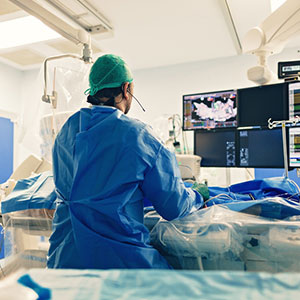Angiogram in Bandlaguda
A cardiologist recommends angiography if you have blood circulation issues towards the heart. Angiography can help to detect coronary heart disease, which can cause stroke and heart attack. Ordinary blood tests don't show the blood vessels that go into your heart. So, they use special dyes and X-rays to find how the blood flows into your heart. The images obtained during the angiography procedure are known as angiogram. It not only just shows the picture, but it as well shows the arteries and veins as well.
Why do you need Angiogram?
Doctors may perform angiogram, when they want to check the signs of any blockage, damage or if there are any abnormal blood vessels. It helps the doctors to identify the source for the problems and to know the amount of damage happened to the blood vessels. There are particular diseases that need angiogram, they are;

- Coronary artery disease is when the arteries narrowed and blocked because of the plaque, this is the main cause for the disease. So the coronary angiogram also known as cardiac catheterization. It helps in taking the images of the heart to know if there is a blockage or the damage in the blood vessels and heart valves
- Atherosclerosis- when there is a fatty substance or cholesterol builds up on and in the artery walls that can narrow the arteries, which may lead to chest pain and heart attack. To identify the problem, coronary angiogram is a procedure conducted by the cardiologists.
- Aneurysm is a kind of weakness that occurs in the bigger vessels such as arteries, it will be identified when you can see a swelling, and then slowly leads to the atherosclerosis. They use the angiogram to diagnose and provide the required treatment.
- Blood clots can be increased and can narrow the artery that leads to the sharp pain in the chest area known as angina. The same test will be used to identify the blood clots and prevents them.
Who performs Angiogram?
The angiogram will be performed by the interventional cardiologist, who specializes in the catheter process of placing stents and other devices necessary for heart function. Vascular surgeons and interventional radiologists perform angiograms for peripheral arteries, while interventional neurologists perform angiograms for the cerebral arteries. They use the images obtained to diagnose and provide treatment.
There are things to follow before going to the test, as angiogram is one the important tests done to know the functioning of the arteries, and the heart valves. They are;
- Leave all the chains and thing you are wearing at home and go to hospital, as you will be asked to remove them.
- Arrange someone who can help you go back home after the procedure.
- Let the doctor know about your allergies, and get all the medication that you are using.
- Lie down on the X-ray table, wearing a hospital gown.
- Then the doctor will consult you and let you know everything about the procedure and it starts
- Let your doctor know if you have diabetes or any other conditions, to advise you about intake of medication and insulin accordingly.
How do they perform the angiogram?
There is a procedure to perform the angiogram by carefully following the doctors’ orders accordingly.
- Anesthesia is given in a particular area to numb before the procedure occurs.
- A small cut is done either in the leg or wrist.
- The cardiologist then passes a thin hollow tube, known as a catheter, by the artery and carefully moves it into the heart.
- The dye is further injected through the catheter.
- Specific X-ray images are taken to determine how the dye moves through the coronary arteries.
- The dye helps diagnose any blockages in the artery, hindering blood flow into your heart.
What all risks of angiogram?
There are risks, even though they are low, there might be some problems in some cases;
- Wounds/bruises depending on the area that is selected for incision, and insertion of the catheter.
- Bleeding if it is near the groin area
- Infections and an allergy reaction to the material used inside the catheter
- Some kidney issues (rarely)
- Rarely heart attack and stroke if there is any blockage or leak in the blood vessels.
The doctor will diagnose and start the treatment based on the results. If there are any blocks or narrowed larger arteries, the doctor will perform angioplasty, a minor surgical procedure involving the placement of a stent in the artery to ensure proper blood flow. For small blockages or blood clots, the doctor will prescribe medication.
Angiogram treatment in Bandlaguda is a safe and painless procedure at Heart hospitals in attapur. The risk of complications is extremely low with this procedure.The risk of complications is extremely low with this procedure. However, some patients may experience some as mentioned above.
For more details, consult Dr. Naresh Kumar Monigari, one of the Best angiogram specialist in upparpally
